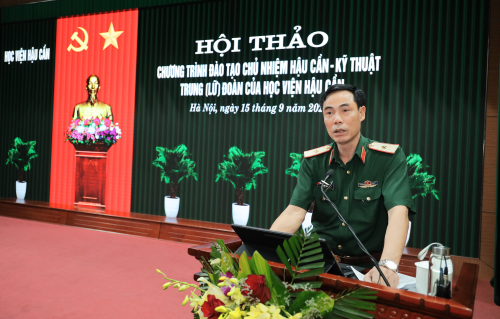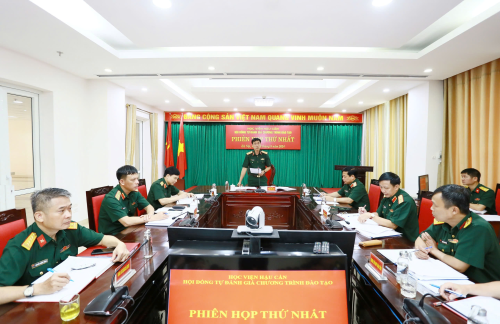Logistics Academy accelerates development and finalisation of training programmes for chief logistics-technical officers
The training of chief logistics-technical officers is a newly assigned, urgent task aimed at meeting the requirements of an “elite, compact, and strong” Army towards modernity. In alignment with its functions and responsibilities, the Logistics Academy has been implementing a series of comprehensive measures to enhance the quality of training for this group, with a key focus on advancing and refining training procedures and programmes.
In line with directives, guidelines, and proposals on logistics-technical officer training and guided by the goals and timelines outlined for merging the Logistics and Technical branches under Resolution No.05-NQ/TW, dated 17 January 2022, of the Politburo (13th Tenure) and Resolution No.230-NQ/QUTW, dated 2 April 2022, of the Central Military Commission, as well as the Ministry of National Defence’s Plan No.1228/KH-BQP dated 25 April 2022, regarding the organisation of the Vietnam People’s Army from 2021 to 2030 and beyond - the Logistics Academy has proactively undertaken a range of strategies and measures to marshal collective strength and fulfil this vital mission. Accordingly, the Academy has conducted a thorough review and assessment of the current state, from organisational structure and faculty qualifications to the syllabus, instructional materials, facilities, and training equipment. Scientific workshops have been held, and feedback has been gathered from various military departments and units, particularly those already integrated under logistics and technical departments. Based on this all-round analysis, the Academy has compiled, amended, and developed two training programmes: one for chief logistics-technical officers at brigade and regiment level and a condensed course for this target group. These programmes integrate over 40% of content focused on technical aspects, ensuring alignment with core perspectives, strategies, and real-world conditions, and have initially achieved the established goals and requirements.
 |
| Leader of the Academy addresses at the Conference on training programme of regimental chief logistics and technical officers |
Nevertheless, as this is a new and demanding endeavour, and given the Academy’s limited resources and the relatively brief research period, certain challenges and limitations remain. These include inadequate continuity in programmes across academic levels, incomplete integration of technical and logistics content, and an imbalance in the curriculum between technical and logistical components. Additionally, aspects critical to supporting training for this new officer cohort - especially in terms of instructor expertise, training grounds, facilities, and instructional materials - have yet to be fully aligned with the evolving requirements of the training processes and programmes.
To meet the demands of training logistics-technical officers in this new context, the Academy is intensifying efforts to develop and refine its training processes and programmes for this group, focusing on several key areas:
Firstly, enhancing leadership and direction across all levels of the command structure for this vital mission. Developing and perfecting the training programme for chief logistics-technical officers is a pressing but intricate task, one that involves multiple superior’s directives and requires coordination across several logistics and technical specialisations, particularly as the integration of the two branches is still ongoing. Accordingly, the Academy requires the Party committees and commanders at all levels to rigorously internalise the superior’s resolutions and initiatives related to military development, education, and training, with a focus on Resolution No.230-NQ/QUTW and Resolution No.1657-NQ/QUTW, dated 20 December 2022, of the Central Military Commission on “Renewing education and training to meet the requirements of the task of developing the Army in the new context” and “Renewing cadre training processes and programmes at all levels in the Army to meet current task requirements” has underscored the significance of understanding the role and importance of constructing and refining logistics-technical officer training programmes, ensuring unified, consistent, and effective execution without redundancy. In the short term, the Academy has tasked the Training Department with acting as the primary coordinating body, overseeing checks and reviews of progress and suggesting support measures to help departments overcome difficulties and meet the 2024 timeline. Proactive monitoring will be conducted to anticipate and align with policies and directives regarding the development of the Logistics-Technical Operational Regulations, the Logistics-Technical Staff Regulations, and real-world merger implementations of the Logistics and Technical branches. These insights will assist the Academy’s Party Committee and Directorate in adjusting and supplementing targets and strategies for fulfilling resolutions and plans by 2025, ensuring feasibility and alignment with actual conditions. A focus will also be placed on leadership efforts to consolidate and train the faculty team effectively, ensuring the availability of appropriate instructional materials, facilities, and equipment in synchrony with the training process and programme requirements.
 |
| Review of logistics and technical officer training programme conducted in 2024 |
Secondly, intensifying research, drawing from practical insights, and consulting experts to review, supplement, and refine training processes and programmes. To fulfil this crucial task, the Academy has established a Programme Evaluation Council, led by the Directorate and including heads of departments and faculties, to direct and manage activities. Experienced and skilled cadres and lecturers have been selected to form task groups responsible for various aspects of process and programme development. Additionally, an operational framework, including regulations, plans, and timelines, has been established. Under the Council’s direction, these groups have effectively undertaken assigned tasks, including hosting three scientific seminars, conducting six preliminary reviews, and coordinating two exercises with the Logistics and Technical departments. This collaborative approach has leveraged collective expertise, incorporating valuable feedback to accelerate progress and enhance the quality of training process and programme development.
Based on accumulated results and lessons learned, particularly from preliminary reviews, the Academy will continue to leverage the Council’s role in guiding and managing departments and faculties to review, adjust, and finalise training programmes under the guiding principles of being “comprehensive, systematic, consistent, and specialised,” with a strong focus on output standards aligned with training objectives. In terms of the training process, research will continue to balance time allocation across different training formats and groups. Concurrently, educational quality control will be strengthened through feedback from cadets and units, allowing prompt adjustments to keep the training process aligned with evolving real-world needs. Regarding the training programme, emphasis will be placed on selecting and diversifying relevant knowledge blocks tailored to logistics-technical specialisations, increasing the proportion of elective courses, and boosting command and technical staff knowledge. Additionally, efforts will be made to streamline, refine, and logically structure the programme content and syllabus, ensuring continuity and progression across academic levels, with the core focus on developing and refining training programmes for chief logistics-technical officers at brigade and regiment levels. This foundation will support programme expansion to cadres in different branches, combat forces, and technical-logistical roles at the divisional level.
Thirdly, strengthening collaboration with military academies and units to align training processes and programmes with practical needs. The military units and agencies that receive and utilise graduates from the Academy play a critical role in contributing to the design of training programmes through feedback and recommendations based on logistical and technical operational realities. Thus, enhancing coordination in education and training in general, developing chief logistics-technical officer training programmes in particular, is essential. The Academy will continue close cooperation with military units to survey and incorporate their feedback on programme content gaps and unit-specific needs. Active partnerships will be pursued to enable staff and lecturers to gain field experience, alongside inviting cadres from various units to participate directly in the Academy’s training process, particularly in exercises and evaluations. In the immediate term, the Academy has directed departments and faculties to expedite the completion of training programmes for chief logistics-technical officers at divisional and equivalent levels, seeking input from military units and gathering feedback on the quality of 2023-2024 graduates. This feedback will be synthesised to refine training processes and programmes, ensuring practical alignment and timely implementation of future training cycles. Simultaneously, the Academy is expanding ties with other military institutions, notably the Military Technical Academy, to exchange and update technical training materials. These enhancements aim to create a unified approach in training chief logistics-technical officers, ultimately building a cadre capable of meeting the modernisation requirements of the Army.
Finally, integrating the development and refinement of training processes, programmes, and curricula with the consolidation and enhancement of educational resources and the promotion of innovative teaching methods. The primary objective of refining training processes, programmes, and content is to improve the quality of graduates. Alongside efforts to enhance the training framework, the Academy is implementing a comprehensive approach, focusing on building each component and innovating every stage of education and training. Central to this strategy is the consolidation and professional development of faculty members, ensuring a synchronised contingent with specialised knowledge across disciplines, encompassing comprehensive logistics and technical expertise, all aligned with quality standards. Simultaneously, the Academy is pushing forward with substantial reforms in teaching and learning methodologies, centred on a learner-focused approach. Emphasis is placed on adopting modern teaching methods, including problem-based learning techniques, which foster self-directed study and research among cadets. Additionally, the Academy is actively collaborating with functional agencies and mobilising resources to invest in the upgrade and modernisation of infrastructure and equipment - especially specialised technical classrooms, training grounds, and information technology infrastructure - laying the foundation for establishing a “smart school” model. This endeavour aims to raise the overall standard of education and training and develop logistics-technical cadres capable of building an “elite, efficient, and strong” Army toward modernity.
Lieutenant General, Associate Professor, Ph.D., PHAN TUNG SON, Director of the Academy